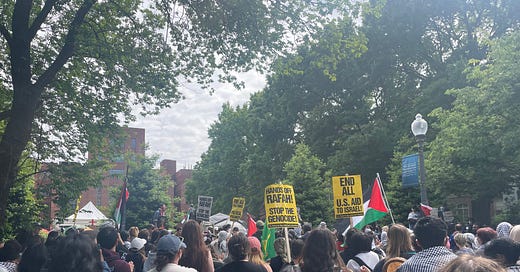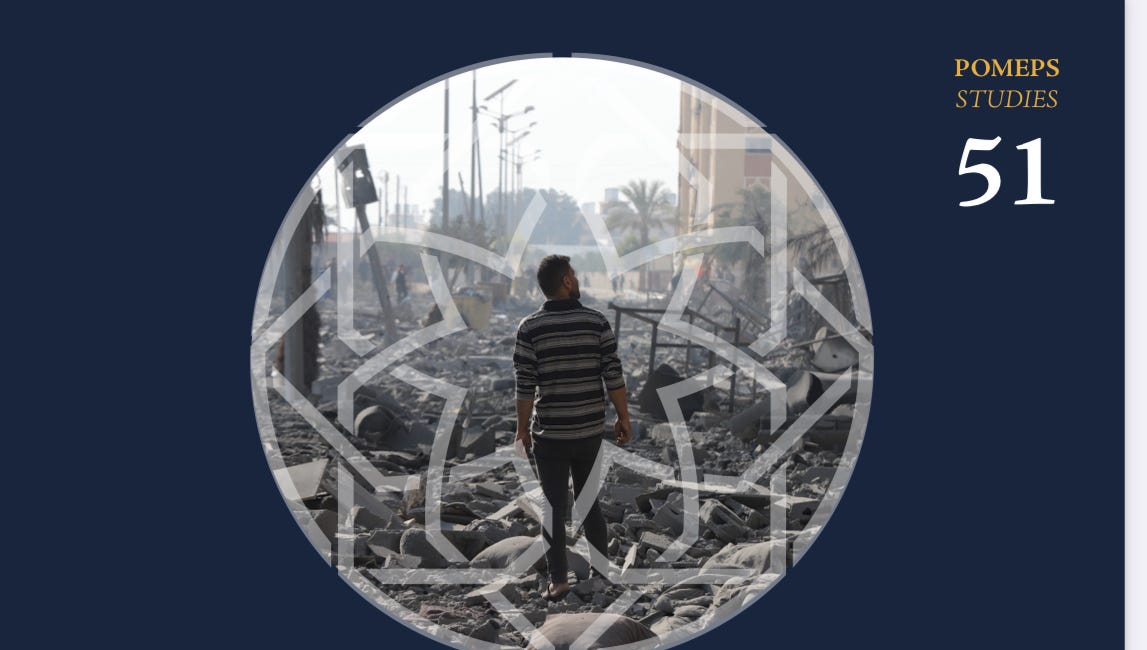The battle to frame campus Gaza protests
Scholars take stock of the discourse on Israel/Palestine as campus battles grow ever fiercer
Last week, during a short trip back to Washington DC, I joined a group of faculty at the George Washington University Gaza encampment protest site at University Yard. In an open letter, we strongly urged the GW administration to avoid cracking down on the protestors and instead embrace their open and free expression:
This is a historical moment in which students across the country and around the world are voicing what they want their universities to be and do in terms of policies, ethics, partnerships, and finances. These protests are anchored in a clear moral compass in the face of Israel’s genocidal campaign against the Palestinians in Gaza through mass killing, widespread destruction, and other acts condemned by the International Court of Justice. These students’ visions are based on an understanding of our collective well-being and, often, in a principled objection to that which impedes it. As faculty, we take our obligation to prepare our students for leadership, critical thinking, global citizenship, and political engagement seriously in an increasingly divided and global society. The purpose of a University is to encourage and allow open and free expression of speech to uphold the democratic ideals of a society. George Washington University, and indeed universities across the DMV and the United States as a whole, will fail in their most basic promises and commitments if they continue to repress, arrest, suspend, and stifle the free speech and political activity of their students. We condemn any move by GW to shut down student gatherings and restrict access rather than open spaces.
The tensions at GW mirror those at campuses across the country, where a wave of student protests over Israel’s devastation of Gaza has been met with endlessly repeated accusations of antisemitism, sometimes violent counterprotests, police actions to clear encampments, and suspensions of student activists (and, far too rarely, tolerance by administrations who proudly welcome the energy and moral engagement of their students - let’s hope that those proud exceptions can be sustained in the face of relentless polarization and national attention). The heavy handed security response at far too many colleges and universities represents an absolute betrayal of the mission of higher education and a deep violation of the rights of their students. A whole lot of university presidents and administrators - starting at Columbia University — need to resign in disgrace immediately.
While it’s easy to feel despair at the vitriol, repression and intensity of the crackdowns, we should also celebrate the incredible energy, passion, and moral compass of the students galvanized by the unprecedented and unacceptable atrocities committed by Israel in a six month campaign of dispossession and destruction which has killed at least (and probably far more) than 15,000 children and nearly completely destroyed Gaza’s schools, hospitals, and infrastructure. This is perhaps the most significant student mobilization on a foreign policy issue since the Vietnam War protests of 1968, or at least the anti-Apartheid campaign of the 1980s, and it should be no surprise that American policy in the Middle East should be the leading wedge of youth outrage. Media and politicians very obviously want to frame these protests as “antisemitic” in order to distract attention from their real purpose of protesting heavily documented and extremely visible U.S.-enabled war crimes in Gaza. We should not let them.
It’s important to recall that genuinely hegemonic positions do not need to exert brute force; the intensity of the institutional backlash against the protests is a sign of the unprecedented weakness of their position with the broader public. But their institutional power is real, and we should be prepared for ever greater legislative, police and campus disciplinary repression — as well as ever more inflammatory and extreme discourse as the election season draws near. I don’t think most people are really aware of how far these legal moves will go, and have already gone, to criminalize critical discussion of Israeli politics and forms of peaceful protest in the name of combating antisemitism, or how deeply those moves could impact academic freedom and faculty autonomy. These battles are only beginning and aren’t going to end when the students go home after graduation.
I disagree with those who complain that the focus on campus protests is a distraction from Gaza. While I was frustrated earlier on with Congressional and media overemphasis on elite campuses, things have changed. When state power is being deployed to crush student protests, that must be engaged at every level by anyone who claims to study political science. When those protests focus on an unfolding potential genocide in Palestine, that must be engaged by anyone who claims to study the Middle East. I will have much more to say about this all soon.
But for now, that brings me to the most recent issue of MENA Politics, the newsletter of the American Political Science Association’s MENA Politics Section which I helped to launch half a decade ago and then handed over to the able hands of Nermin Allam, Gamze Cavdar and Sean Yom (whose term as editors ends with this edition). As always, it’s a rich and substantial collection. It includes a short essay by me and Shibley Telhami on the Middle East Scholars Barometer which discusses the goals, history, and key findings of our biannual survey, including some which have not previously been published. It also includes a fascinating symposium on elections in the Middle East.
But the heart of the issue is a collection of fourteen essays on Gaza by a wide range of political scientists, framed by an important retrospective on the study of Israel and Palestine in the American academy by the estimable Ian Lustick, who recounts an appalling but all too typical history of attempted censorship and harrassment. We are fortunate that Lustick persevered with his groundbreaking studies of the regimes of control over Arabs in Israel, the rise of Jewish fundamentalism in Israel, and his magum opus (and one of the best books I’ve read, Unsettled States, Disputed Lands, a comparison of Israel/Palestine, Northern Ireland, and Algeria which showed me that Israel and Palestine could be studied in a genuinely comparative way and taught me a lot about how to think about hegemony and the possibility of change. His most recent book, Paradigm Lost, helped pave the way to our own book on the One State Reality.
Lustick’s panoramic view sets the stage for the impassioned and deeply engaged short essays about Gaza which follow. The symposium is framed by its editors, Nermin Allam, Diana Greenwald, and Noora Lori, all great young scholars in their own right who should be applauded for their courage in fronting discussion of this issue at this moment:
Narratives of demonization and dehumanization are feeding into a climate of fear and vulnerability, while we are also witnessing heightened censorship of speech on college campuses and beyond. In sum, this is a fraught time to attempt to apply the tools and lenses of social science. Nonetheless, this is precisely the moment that we should turn to political science– drawing on existing research, methods, and tools for understanding the ferocity and scale of the devastation we are witnessing, its ori- gins, its nature, and its manifold consequences. Further, this is precisely the moment that we should place a mirror in front of political science, considering how the past six months has exposed our discipline’s gaps and limitations.
That’s right, and it’s something we tried to do in our recent POMEPS collection on Middle East Studies and the Middle East after Gaza; this symposium builds powerfully on our efforts.
The Middle East and Middle East Studies After Gaza
POMEPS releases the 51st volume of its POMEPS Studies open access journal today. The theme is grim but urgent: The Middle East and Middle East Studies After Gaza. The collection originated as an open call for papers for scholars to assess the impact of the October 7 Hamas attack and Israel’s war on Gaza which followed. Many of the authors focused on …
The short essays in the MENA Politics symposium range widely, challenging assumptions and framing from the perspective of various literatures and traditions. Bassam Haddad challenges the framing of Israel/Palestine as a “conflict” rather than as a “military occupation, settler colonialism, and Apartheid”, with so much following from that misrepresentation of reality. Christine Schwöbel-Patel and Nahed Samour similarly challenge the framing of the devastation of Gaza as a “war” which began on October 7 from the perspective of international law. Raz Segal examines the erasure of the Palestinian Nakba from Zionist thought in the context of a broader discussion of the applicability of theories and concepts of genocide, a question with which Mark Tessler also grapples. Mohammed Abu-Nimer challenges the misframing of Israel/Palestine as a religious conflict and warns of the weaponization of religious discourse for dehumanization. Abigail Bakan challenges the claim that anti-Zionism is antisemitism. Yasmeen Abu-Laban argues for the necessity of including race in our analyses.
Dana El Kurd’s contribution looks at protest across the Arab world over Gaza, challenging claims that Arabs had somehow lost interest in Palestine. Amytess Girgis, Neil Ketchley, and Sean Lee look at boycotts as a form of protest, offering intriguing evidence about the effects of activist boycotts of companies such as McDonalds and Starbucks over Gaza. Anwar Mhajne examines gender based violence in the conflict, including the controversies over allegations of Hamas rapes and sexual assault on October 7. Samer Anabtawi considers the invocation of LGBTQ Palestinians in the arguments over the war. Youssef Chohoud examines trends in U.S. public opinion towards Israel and the war. And Jonathan Graubart considers the prospects for conflict resolution in the absence of a broader political transformation.
Download the full issue of MENA Politics here. There is so much more that political scientists can and should be engaging at a critical juncture in the history of Israel, Palestine, and America’s role in the Middle East. It couldn’t be more important to the discipline to rise to that challenge, and it couldn’t be more important to policy debates that informed analysis penetrate the relentless fog of propaganda and spin.





